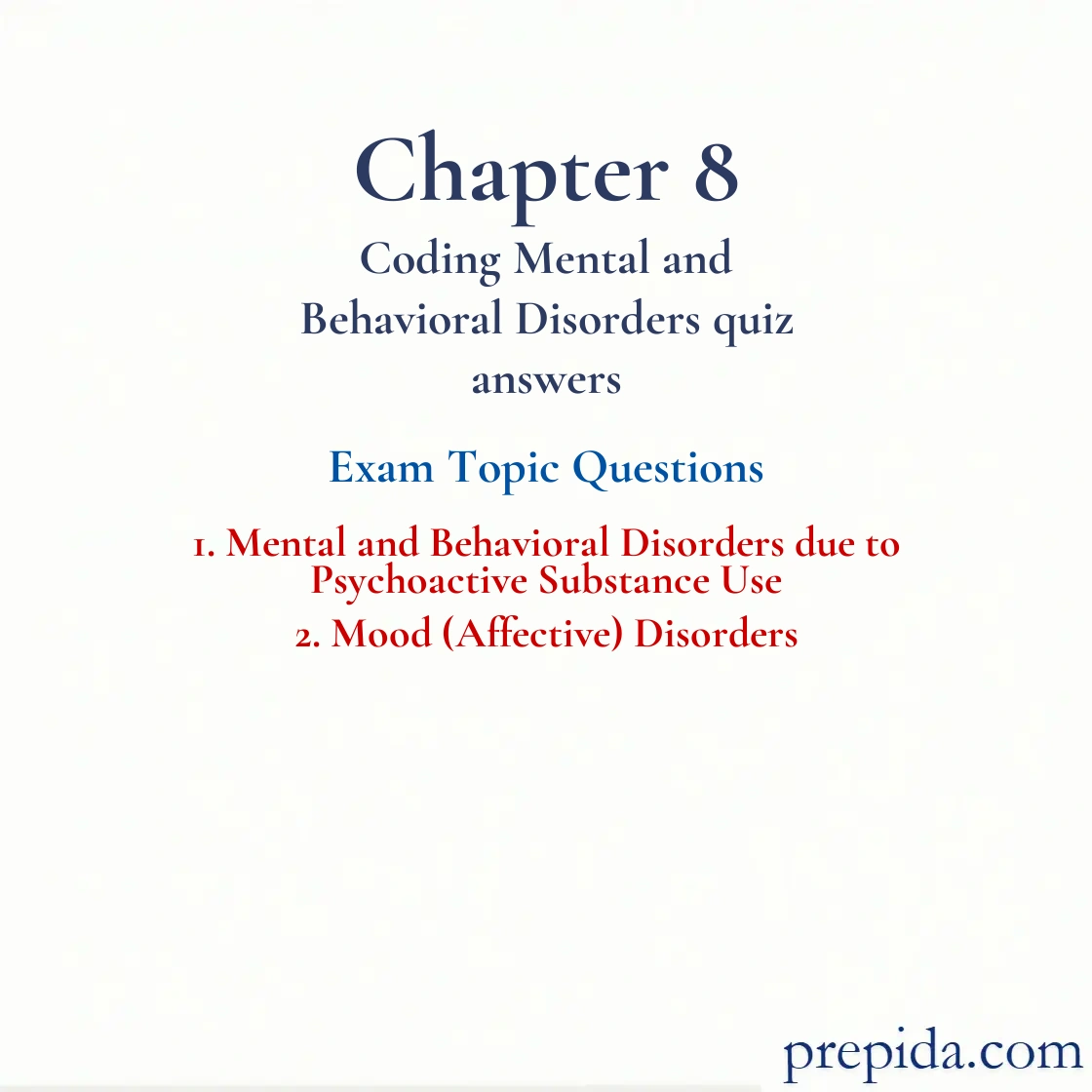
What is the correct code for sedative hypnotic abuse with intoxication delirium?
- F13.120
- F13.121
- F13.129
- F13.150
The correct code for sedative hypnotic abuse with intoxication delirium is F13.121. F13.121: Index>abuse>sedative>intoxication>with delirium.
Diagnosis: A physician’s determination of a patient’s condition, illness, or injury.
What is the correct code for tobacco use?
- F17.209
- F17.219
- Z87.891
- Z72.0
The correct code for tobacco use is Z72.0. Z72.0: Index>use>tobacco.
Diagnosis: A physician’s determination of a patient’s condition, illness, or injury.
What is the correct code for hallucinogen dependence with hallucinogen-induced psychotic disorder with delusions?
- F16.250
- F16.251
- F16.259
- F16.280
The correct code for hallucinogen dependence with hallucinogen-induced psychotic disorder with delusions is F16.250. F16.250: Index>dependence>drug>hallucinogen>with>psychosis>delusions.
Fracture: Broken cartilage or bone.
What are the ends of neurons called?
- Dendrites
- Synapses
- Transmitters
- None of these
The ends of neurons are called dendrites.
Consumption of a substance without significant clinical manifestations is called:
- abuse.
- dependence.
- use.
- None of these
Consumption of a substance without significant clinical manifestations is known as use.
Manifestation: A condition caused or developed from the existence of another condition.
Ongoing, regular consumption of a substance with resulting clinical manifestations is called:
- abuse.
- dependence.
- use.
- None of these
Ongoing, regular consumption of a substance with resulting clinical manifestations is known as abuse.
Manifestation: A condition caused or developed from the existence of another condition.
Ongoing, regular consumption of a substance with significant resulting clinical manifestations is known as:
- abuse.
- dependence.
- use.
- None of these
Ongoing, regular consumption of a substance with significant resulting clinical manifestations is known as dependence.
Manifestation: A condition caused or developed from the existence of another condition.
What is the correct code for alcohol abuse with intoxication delirium?
- F10.120
- F10.121
- F10.129
- F10.159
The correct code for alcohol abuse with intoxication delirium is F10.121. F10.121: Index>abuse>alcohol>with>intoxication>with delirium.
Diagnosis: A physician’s determination of a patient’s condition, illness, or injury.
What is the correct code for alcohol dependence with alcohol-induced anxiety disorder?
- F10.280
- F10.281
- F10.282
- F10.288
The correct code for alcohol dependence with alcohol-induced anxiety disorder is F10.280. F10.280: Index>dependence>alcohol>with>anxiety.
ICD-10-CM: The acronym for International Classification of Diseases, Tenth Revision, Clinical Modification.
What is the correct code for cannabis abuse with intoxication and perceptual disturbance?
- F12.120
- F12.121
- F12.122
- F12.129
The correct code for cannabis abuse with intoxication and perceptual disturbance is F12.122. F12.122: Index>abuse>drug>cannabis>with>intoxication>perceptual disturbance.
What is the correct code for withdrawal from inhalant abuse with inhalant-induced anxiety disorder?
- F18.18
- F18.180
- F18.188
- F18.19
The correct code for withdrawal from inhalant abuse with inhalant-induced anxiety disorder is F18.180. F18.180: Index>abuse>drug>inhalant>with>anxiety.
What is the correct code for cocaine dependence in remission?
- F14.20
- F14.21
- F14.22
- F14.220
The correct code for cocaine dependence in remission is F14.21. F14.21: Index>dependence>drug>cocaine>in remission.
What is the correct code for cocaine abuse with intoxication?
- F14.10
- F14.120
- F14.121
- F14.122
The correct code for cocaine abuse with intoxication is F14.120. F14.120: Index>abuse>drug>cocaine>with>intoxication>uncomplicated.
How many types of bipolar disorder are there?
- 1
- 2
- 3
- 4
There are two types of bipolar disorder: Type I bipolar disorder is identified as alternating between manic episodes and depressive episodes, while type II bipolar patients deal with recurring depressive episodes with occasional mania.
What is the correct code for type II bipolar disorder?
- F31.70
- F31.72
- F31.81
- F31.89
The correct code for type II bipolar disorder is F31.81. F31.81: Index>disorder>bipolar>type II.
Bipolar disorder is categorized as a(n):
- anxiety disorder.
- depression disorder.
- mood disorder.
- psychotic disorder.
Bipolar disorder is categorized as a mood disorder.
Respiratory Disorder: A malfunction of the organ system relating to respiration.
What is typically prescribed to treat bipolar disorder?
- Mood stabilizers
- Atypical antipsychotics
- Antidepressants
- All of these
Mood stabilizers, atypical antipsychotics, and antidepressants are most commonly prescribed in combination to treat bipolar disorder.
Other Specified: Additional information that the physician specified and isn’t included in any other code description.